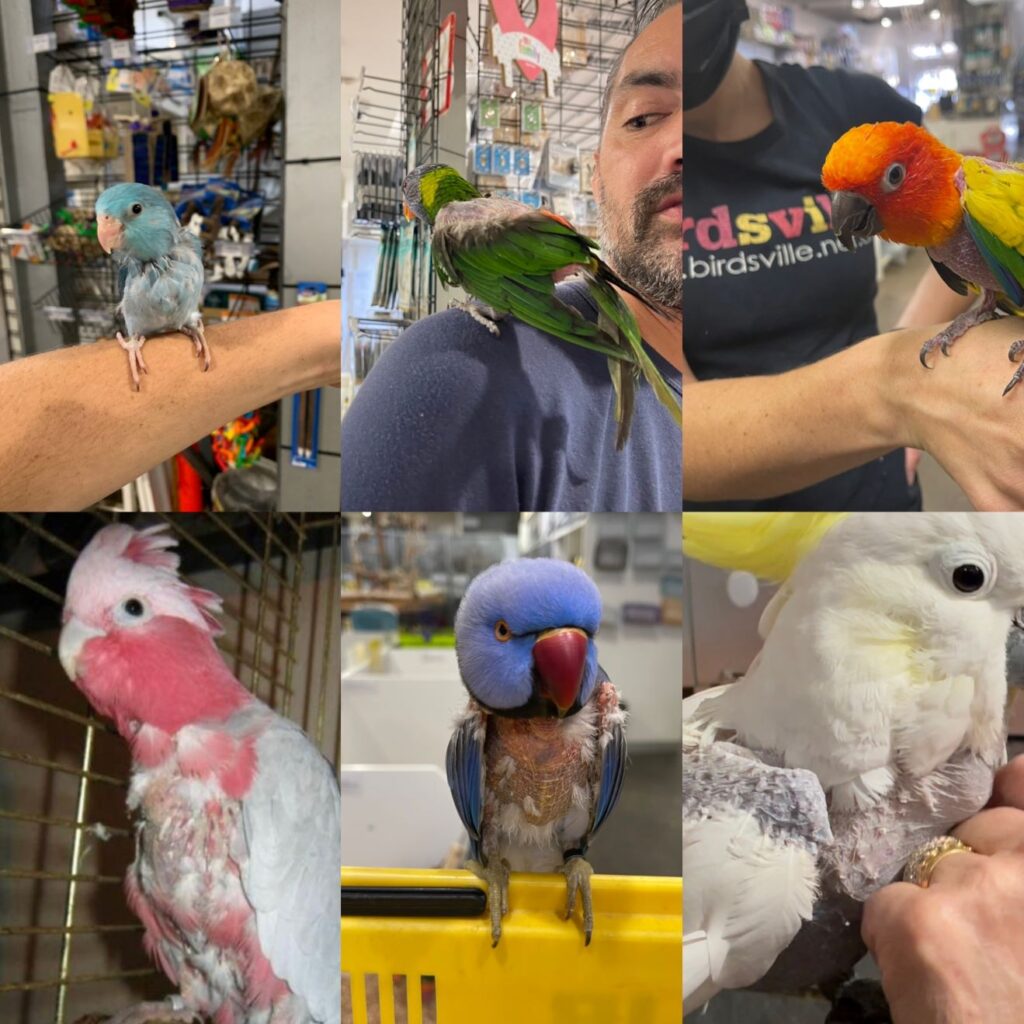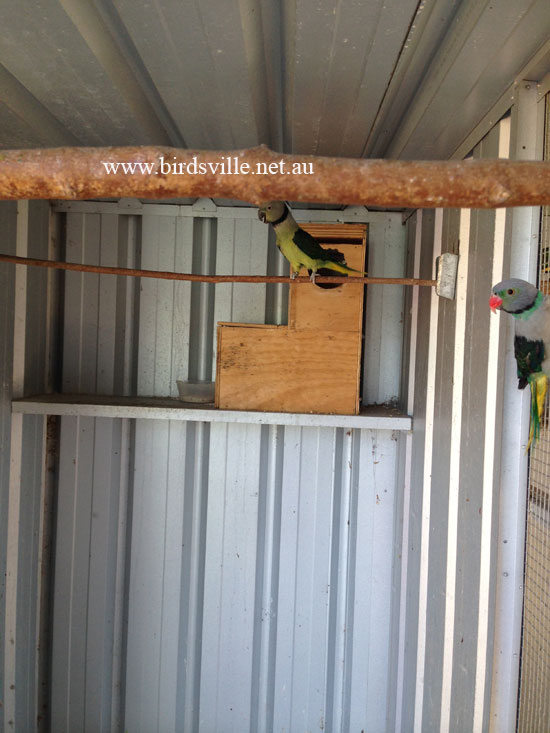How to stop Parrots squawking & screaming?
This article will help you Understand typical behaviors of wild parrots to gain insight to help aid training for reducing squawking behavior in domestic parrots.
We will review and go through both old and new techniques to modify parrot squawking behavior, emphasizing the effectiveness of positive training techniques over punishment.
Positive training is recommended as the most effective method for changing unwanted behaviors as it has shown overwhelmingly better results.
Firstly, you have to understand that all parrots are going to make noise. Parrots are noisy creatures just like they are in the wild. Even wild parrots do not make noise all the time as we will also talk about. We want to stop them screaming any more than they naturally would.
To understand the why and when about parrot Squawking, we can work out how to stop some of these undesirable parrot traits that occur or reduce it using our Birdsville triangle method and solutions.
When wild parrots are noisy or quiet.
Almost all species of parrots cannot see well at night and therefore will roost before the sun has set. Spend an afternoon in the bush and you will notice parrots are more vocal in the morning and the afternoon. Parrots are often more vocal in larger groups and quieter in smaller groups.
Parrots will often be quiet during their feeding times; this may be due to the fact they are vulnerable on the ground and need to listen for predators.
Parrots can be quite vocal before they become aggressive to another parrot or interloper intruding their territory.
Parrots will be vocal when alarmed or scared, when a parrot notices a possible danger in the wild it will give an alarm call and the entire flock will immediately take flight.
Reasons for Squawking in Pet Parrots
Parrots are highly social birds, and squawking is one of the ways that they communicate. Parrots use a variety of vocalizations, from whistles to screeches. However, their most common sound is a loud screech or squawk—a sound that parrot owners may find familiar!
Squawking can serve many purposes for a parrot. It is commonly used to establish and maintain contact with other parrots, or as an alarm call when they feel threatened. They may also squawk if they are excited or demanding attention.
A parrots highly developed vocalization system allows them to communicate effectively with their flock members, as well as humans. In the wild, parrots often squawk in chorus to create a “mobbing” effect that can scare away potential predators.
It is important for parrot owners to understand why their pets are squawking and to respond appropriately. If your parrot is squawking out of fear or anxiety, try to provide it with comfort and reassurance. If it is trying to get your attention, providing it with companionship and engaging activities can help prevent excessive squawking.
Parrot owners should also be aware that loud and frequent squawking can be a sign of distress. If this is the case, you are on the right page we will help with this issue as well.
A nutrient deficient diet can lead to a parrot squawking. If your parrot doesn’t have good health this can make them feel irritable and make them more likely to squawk excessively.
How to stop a Parrot squawking
The reasons for squawking and how to reduce it almost always fit under the Birdsville triangle which is Diet, Environment and training. To reduce Squawking, it can be tackled from any side of the triangle but it’s much better to work with all 3 points and you will end up with a healthier and happier.
If the triangle approach doesn’t work which is rare if done properly then it could be an underlying health issue and we would recommend visiting one of our recommended vets or a good local avian vet that you trust. A list of vets around Australia can be found click on our common bird illness page.
Diet to help stop squawking in parrots
Nutrition and Diet is an important factor in reducing parrot squawking. The number one thing to help reduce your parrots noise level is to have your parrots well fed on a nutritious diet. Well-fed nourished birds are more relaxed and quieter.
We have formulated a healthy diet for every species of parrot, most parrot owners believe their bird is on a healthy diet, and they are way off. Some packaging and labeling are misleading, and they think their bird is getting all these vitamins and minerals. Some parrots are overloaded with vitamins and others it’s a lack thereof. Some parrots are not receiving enough fat-soluble vitamins when in fact they are on a diet that many breeders would never feed their bird.
We have a diet Plan for every species of parrot, if we haven’t gotten to your species of parrot, click onto a similar species of parrot through our menu but you need to add the extras such as our Birdsville blend which is a great combination of seeds, legumes, nuts, herbs with superfoods added like chilies and beetroot. We recommend adding this mix to budgie mix for most parrots of our Birdsville blend. We also recommend adding the good oil through the seed mix with the addition of synbiotic or probiotic.
Sunlight or vitamin D supplement if you do not have an outside area. We do also stock vitamin D lights as well. Vitamin D gets filtered out by glass, so placing a bird next to a sunny window will not work.
For in depth parrot diet information check out our main page menu and find your species of parrot and scroll down to the diet section, take note of the guidelines such as % of grain to pellets and everything else mentioned and add what’s recommended in this thread that you are reading.
High quality grain without a lot of sunflowers is very important be wary of many supermarket brands with colorful boxes claiming to be full of vitamins as they are often of low quality. A diet of only pellets may give them a vitamin overdose and even cause toe tapping. Not enough vitamin B is also thought to cause aggression. If you suspect your adult Parrot is squawking from stress or anxiety, then we want you to swap the recommended pellets mentioned on our Birdsville bird species list for B-calm pellets from vetafarm, all these products are always available in store.
FYI Feeding your birds sugary foods will make them hyper and more noisy.
Environment to reduce squawking in parrots
Environment includes Everything to do with their environment, from out of cage and inside the cage time that includes toys and activities, socialization, The cage, sound, positioning and more.
Toys and activities
It is also important to provide your parrot with enrichment items such as plenty of toys that stimulate the bird and encourage play instead of vocalization. This will help keep your parrot entertained throughout the day and prevent boredom-related squawking. Providing multiple types of toys and rotating them regularly will help keep your parrot engaged and interested.
Out of cage time actually helps to keep their noise level down. You will notice they get to come out of the cage regularly they will reduce their noise levels. At Birdsville we have a range of toys that will keep them very busy giving them activities. Refillable toys are very popular options.
socialization
A parrot squawking could be the call of boredom or loneliness. Is your parrot spending a lot of time alone with no other living creatures nearby? As highly social creatures they like to be around life. Parrots in the wild will flock with not only their own species but other species. Do you have other animals, they may all benefit by being kept in the same room. Maybe you could get your parrot a friend? We have had many customers adopt our re homers and have found 2 birds are quieter than one. There is also a possibility of more noise if you have 2 parrots. Get a bird harness and take your parrot on outings may help reduce your parrots overall noise.
Training to reduce squawking in Parrots
Training, patterns There is 2 types of training positive re enforcement and negative re enforcement. Both these and much more training is on our parrot training page. Keep a diary on when your bird is noisy and try to see if they have any triggers, this will go a long way in understanding Parrot body language.
Understanding Parrot Body language is important aspect in being in tune with your parrot to know how to train them and reduce Noise Levels. See our link Understanding parrot body language and scroll down.
It is important to implement consistent training with your parrot in order to prevent excessive squawking. Training should focus on positive reinforcement techniques such as reward-based methods that encourage desirable behaviors instead of punishing the bird for vocalizations.
Establish a routine with your parrots but the routine needs to be consistent, it doesn’t have to be every day, it can be every second day. If parrots have the same routine a stressed parrot with excessive squawking could get even more stressed because the routine has been broken and then create a plucking issue.
Punishment based Parrot training techniques
These are all training techniques that are not recommended.
- Yelling at the bird. This is a very common technique humans use and its actually something that triggers birds to squawk more –
- Throwing items at the bird cage. This will only increase the stress in a bird and the bird will lose trust in you.
- giving your parrot a toy to distract them from squawking – this can actually teach them to squawk more. They will squawk so you give them more toys.
Parrot positive Training techniques.
These training techniques will get you results
- Give your bird a treat when they are sitting their in a relaxed state and being quiet.
- when you understand the parrot body language you can be in tune with your parrot and have an idea when they are about to squawk
- If you parrot is screaming for attention the worst thing is to try and try to stop them screaming, you should ignore the parrot completely and not have any reaction to their screaming at all.



